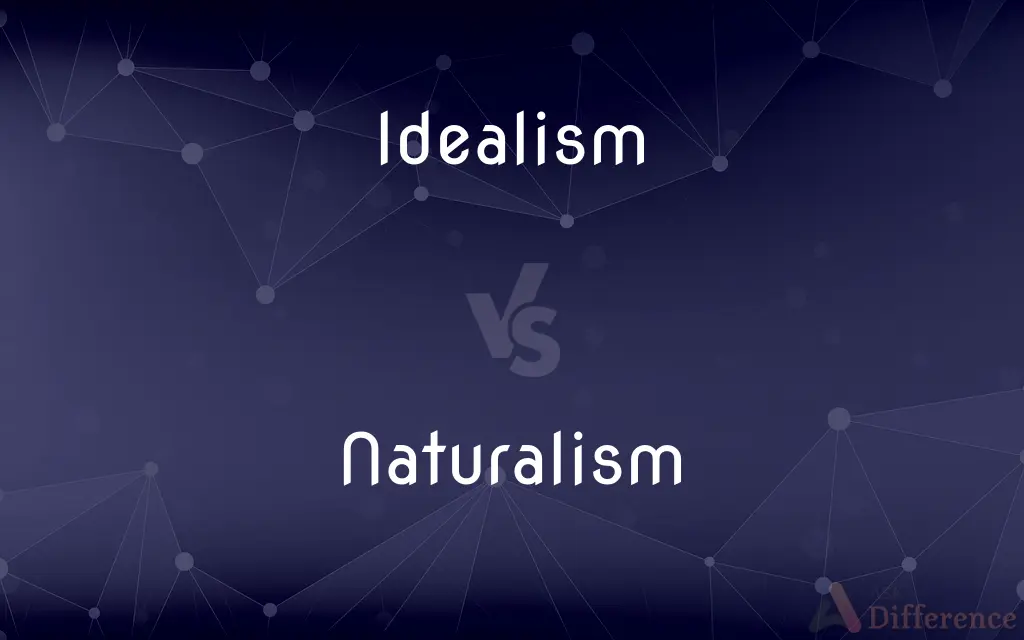Idealism vs. Naturalism — What's the Difference?
By Tayyaba Rehman & Fiza Rafique — Updated on March 8, 2024
Idealism emphasizes the role of the mind in shaping reality, whereas naturalism asserts that natural laws govern the universe, undirected by mental constructs.

Difference Between Idealism and Naturalism
Table of Contents
ADVERTISEMENT
Key Differences
Idealism posits that reality, or reality as we can know it, is fundamentally mental, mentally constructed, or otherwise immaterial. Idealists assert that the human mind actively gives shape and structure to the world of experience, arguing that reality is a mental construct. On the other hand, naturalism is a philosophical viewpoint according to which everything arises from natural properties and causes, and supernatural or spiritual explanations are excluded or discounted. Naturalists argue that the universe operates through natural processes, guided by laws of nature, and that understanding these processes through science provides a comprehensive picture of reality.
While idealism focuses on the primacy of consciousness in understanding the world, suggesting that our perceptions and ideas form the basis of all knowledge, naturalism bases its understanding strictly on empirical evidence and the scientific method. In this view, only phenomena within the realm of science can be considered real or true, whereas idealism allows for a broader interpretation of what constitutes reality, often including the subjective, the abstract, or the spiritual.
Idealism often leads to a more subjective interpretation of the world, where the emphasis is placed on how our minds interpret and construct the reality we experience. This perspective can influence various fields, including ethics, where idealists might argue that moral truths are just as real as physical ones, shaped by human consciousness. Conversely, naturalism tends to foster a more objective view, where ethical values are seen as human constructs that arise naturally through evolution or social processes, without inherent universal validity.
In the realm of science and knowledge, idealism can sometimes challenge the objectivity of findings, suggesting that scientific knowledge is as much a product of the scientist's mental framework as it is of the external world. This contrasts sharply with naturalism, which holds that scientific inquiry can uncover objective truths about the world, independent of human thought or feeling, through rigorous testing and evidence.
Idealism might stress the importance of developing the mind and moral character, focusing on philosophical, ethical, and artistic education as a means to form well-rounded individuals. Naturalism, in contrast, might emphasize education based on understanding the natural world, encouraging empirical learning and scientific reasoning as the foundation for knowledge and human progress.
ADVERTISEMENT
Comparison Chart
Foundation
Mind and consciousness
Natural laws and processes
Reality
Constructed by mental activities
Determined by natural forces, independent of mind
Knowledge
Gained through introspection and reasoning
Derived from empirical evidence and observation
Ethics
Morality is absolute, shaped by human consciousness
Morality is relative, shaped by natural and social evolution
Education
Focuses on developing moral and intellectual capabilities
Emphasizes empirical learning and understanding of the natural world
Compare with Definitions
Idealism
A philosophical stance prioritizing ideas, values, or spiritual experiences as the fundamental nature of reality.
In idealism, understanding the universe requires an exploration of the mind and consciousness.
Naturalism
Naturalism implies that ethical values have evolved through social and biological processes.
Ethical naturalism argues that moral truths are grounded in human nature and societal conventions.
Idealism
Idealism often emphasizes the importance of moral and ethical principles in shaping human experience.
Kant's idealism posits that moral imperatives are universally valid, transcending empirical reality.
Naturalism
Naturalistic education emphasizes learning through observation and experimentation.
A naturalistic education system encourages scientific inquiry and critical thinking skills to understand the world.
Idealism
The belief that reality is mentally constructed or immaterial.
Plato's theory of Forms argues for an idealistic reality, comprised of abstract, perfect ideals.
Naturalism
The belief that the universe is governed by natural laws, which science aims to uncover.
Newtonian physics showcases naturalism through its laws of motion and universal gravitation.
Idealism
The perspective that the mind plays a crucial role in forming our experience of reality.
Berkeley's idealism suggests that objects only exist to the extent that they are perceived.
Naturalism
In literature and art, naturalism portrays life realistically, focusing on everyday events and conditions.
Zola's novels depict life's struggles in a naturalistic manner, emphasizing environmental and hereditary factors.
Idealism
In educational theory, idealism advocates for teaching that fosters critical thinking and moral development.
An idealist education system prioritizes philosophy, literature, and arts to cultivate virtuous citizens.
Naturalism
A philosophy that everything arises from natural causes, dismissing supernatural influences.
Darwin's theory of evolution exemplifies naturalism by explaining species diversity through natural selection.
Idealism
In philosophy, idealism is a diverse group of metaphysical views which all assert that "reality" is in some way indistinguishable or inseparable from human perception and/or understanding, that it is in some sense mentally constructed, or that it is otherwise closely connected to ideas. In contemporary scholarship, traditional idealist views are generally divided into two groups.
Naturalism
(in art and literature) a style and theory of representation based on the accurate depiction of detail
His attack on naturalism in TV drama
Idealism
The unrealistic belief in or pursuit of perfection
The idealism of youth
Naturalism
The philosophical belief that everything arises from natural properties and causes, and supernatural or spiritual explanations are excluded or discounted
This romanticized attitude to the world did conflict with his avowed naturalism
Idealism
Any of various systems of thought in which the objects of knowledge are held to be in some way dependent on the activity of mind.
Naturalism
The practice of describing precisely the actual circumstances of human life in literature.
Idealism
The act or practice of envisioning things in an ideal and often impractical form.
Naturalism
The practice of reproducing subjects as precisely as possible in the visual arts.
Idealism
Pursuit of one's ideals, often without regard to practical ends.
Naturalism
A movement or school advocating such precise representation.
Idealism
Idealized treatment of a subject in literature or art.
Naturalism
The principles and methods of such a movement or of its adherents.
Idealism
(Philosophy) The theory that the object of external perception, in itself or as perceived, consists of ideas.
Naturalism
(Philosophy) The system of thought holding that all phenomena can be explained in terms of natural causes and laws.
Idealism
The property of a person of having high ideals that are usually unrealizable or at odds with practical life.
Naturalism
(Theology) The doctrine that all religious truths are derived from nature and natural causes and not from revelation.
Idealism
The practice or habit of giving or attributing ideal form or character to things; treatment of things in art or literature according to ideal standards or patterns;—opposed to realism.
Naturalism
Conduct or thought prompted by natural desires or instincts.
Idealism
(philosophy) An approach to philosophical enquiry, which asserts that direct and immediate knowledge can only be had of ideas or mental pictures.
Naturalism
A state of nature; conformity to nature.
Idealism
The quality or state of being ideal.
Naturalism
The doctrine that denies a supernatural agency in the miracles and revelations recorded in religious texts and in spiritual influences.
Idealism
Conception of the ideal; imagery.
Naturalism
(philosophy) Any system of philosophy which refers the phenomena of nature as a blind force or forces acting necessarily or according to fixed laws, excluding origination or direction by a will.
Idealism
The system or theory that denies the existence of material bodies, and teaches that we have no rational grounds to believe in the reality of anything but ideas and their relations.
Naturalism
(philosophy) A doctrine which denies a strong separation between scientific and philosophic methodologies and/or topics
Idealism
The practice or habit of giving or attributing ideal form or character to things; treatment of things in art or literature according to ideal standards or patterns; - opposed to realism.
Naturalism
(arts) A movement in theatre, film, and literature that seeks to replicate a believable everyday reality, as opposed to such movements as romanticism or surrealism, in which subjects may receive highly symbolic or idealistic treatment.
Idealism
A belief in the feasibility of the implementation of ideal principles and noble goals, and the practice or habit of pursuing such goals; - opposed to realism and cynicism.
Naturalism
(nonstandard) naturism, nudism, social nudity.
Idealism
(philosophy) the philosophical theory that ideas are the only reality
Naturalism
The belief in natural law.
Idealism
Impracticality by virtue of thinking of things in their ideal form rather than as they really are
Naturalism
A state of nature; conformity to nature.
Idealism
Elevated ideals or conduct; the quality of believing that ideals should be pursued
Naturalism
The doctrine of those who deny a supernatural agency in the miracles and revelations recorded in the Bible, and in spiritual influences; also, any system of philosophy which refers the phenomena of nature to a blind force or forces acting necessarily or according to fixed laws, excluding origination or direction by one intelligent will.
Naturalism
The theory that art or literature should conform to nature; realism; also, the quality, rendering, or expression of art or literature executed according to this theory.
Naturalism
The principles and characteristics professed or represented by a 19th-century school of realistic writers, notably by Zola and Maupassant, who aimed to give a literal transcription of reality, and laid special stress on the analytic study of character, and on the scientific and experimental nature of their observation of life.
Naturalism
(philosophy) the doctrine that the world can be understood in scientific terms without recourse to spiritual or supernatural explanations
Naturalism
An artistic movement in 19th century France; artists and writers strove for detailed realistic and factual description
Common Curiosities
What is the main difference between idealism and naturalism?
Idealism focuses on the mind's role in constructing reality, while naturalism emphasizes natural laws and forces as the basis of reality.
What role does science play in naturalism compared to idealism?
In naturalism, science is the primary means to understand reality, based on empirical evidence and observation. Idealism, while not dismissing science, allows for knowledge that comes from introspection and reasoning.
Can idealism and naturalism coexist in any philosophy?
While fundamentally different, some philosophical perspectives attempt to integrate aspects of both to address complex questions about reality and knowledge.
How do idealism and naturalism approach the concept of morality?
Idealism often views moral values as absolute, shaped by human consciousness, whereas naturalism sees morality as relative, arising from natural and social evolution.
How do idealism and naturalism influence education?
Idealism advocates for education that develops the mind and moral character, focusing on philosophy and the arts. Naturalism emphasizes empirical learning and the scientific understanding of the natural world.
Does idealism deny the existence of the physical world?
Not necessarily. Some forms of idealism argue that while the physical world exists, our understanding and experience of it are shaped by our perceptions and mind.
How does idealism view the relationship between mind and world?
Idealism views the mind as actively shaping or constituting the world of experience, suggesting a fundamental connection between consciousness and reality.
In what ways do idealism and naturalism differ in their view of science?
Idealism acknowledges the role of science but emphasizes the interpretative role of the mind in understanding scientific knowledge. Naturalism relies more heavily on science as the objective method to discover truths about the world.
Can naturalism explain everything in the universe?
Naturalism seeks to explain phenomena through natural laws and processes, but there are debates about its ability to fully explain consciousness, morality, and other abstract concepts.
What impact do idealism and naturalism have on the arts?
Idealism may inspire art that explores abstract, spiritual, or philosophical themes. Naturalism influences art that seeks to represent life and the natural world realistically.
What is a common critique of naturalism?
Critics argue that naturalism may overlook the importance of subjective experiences, consciousness, and moral values that cannot be fully explained by natural laws alone.
How do idealism and naturalism interpret human behavior?
Idealism might view human behavior as influenced by cognitive and spiritual factors, while naturalism tends to explain behavior through biological, psychological, and environmental determinants.
Is naturalism synonymous with materialism?
While closely related, naturalism broadly encompasses the belief in natural laws and processes, which can include aspects of the mind and consciousness, whereas materialism strictly views reality as material or physical.
Can idealism contribute to scientific advancements?
Yes, by emphasizing the importance of conceptual frameworks and theories, idealism can inspire new ways of thinking and understanding in science.
How does naturalism approach the study of the mind?
Naturalism approaches the study of the mind from a scientific perspective, often through neuroscience and psychology, aiming to understand mental processes as part of the natural world.
Share Your Discovery

Previous Comparison
Digestion vs. Absorption
Next Comparison
Corporation vs. PartnershipAuthor Spotlight
Written by
Tayyaba RehmanTayyaba Rehman is a distinguished writer, currently serving as a primary contributor to askdifference.com. As a researcher in semantics and etymology, Tayyaba's passion for the complexity of languages and their distinctions has found a perfect home on the platform. Tayyaba delves into the intricacies of language, distinguishing between commonly confused words and phrases, thereby providing clarity for readers worldwide.
Co-written by
Fiza RafiqueFiza Rafique is a skilled content writer at AskDifference.com, where she meticulously refines and enhances written pieces. Drawing from her vast editorial expertise, Fiza ensures clarity, accuracy, and precision in every article. Passionate about language, she continually seeks to elevate the quality of content for readers worldwide.















































